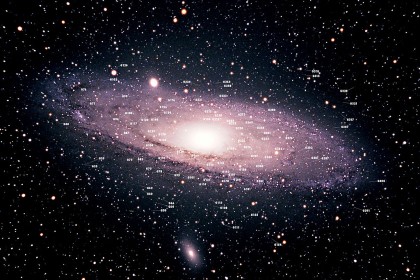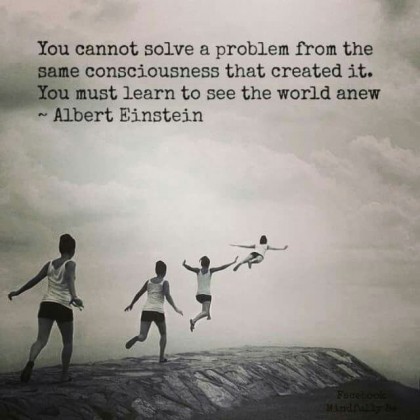Samain Bare Aspen Moon

Not trying to do this, but last night, before I fell asleep the subject was space. The first three kabbalah classes are titled: soul, space, time. The other night I got caught up in the concept of time. I realize my thinking on these matters is probably naive relative to, say, astrophysics, but I’m trying thought experiments to come to my own understanding. I’m trying to read the book of the universe on my own, pursuing what Emerson called original revelation to us.
So here was the thought experiment on space. Imagine space as a large box. Or disc. Or sphere, whatever object. Now. Remove all the objects in it. All the galaxies. All the stars in the galaxies. All the planets. All the debris traveling anywhere. All the black holes. Everything. So now we have a large, empty universe. There is, I think, at this point, nothing but space. No thing.
 Empty. No way to know where you are because there are no reference points. Only empty space. But. This amount of space is contained by the limits of the universe. (I’m pretty sure this experiment violates some way of understanding the universe. An edge to the universe seems difficult to comprehend, but let me have this small-ok, large-conceit.) Now we put back in all the stuff. The things. Right back where they were.
Empty. No way to know where you are because there are no reference points. Only empty space. But. This amount of space is contained by the limits of the universe. (I’m pretty sure this experiment violates some way of understanding the universe. An edge to the universe seems difficult to comprehend, but let me have this small-ok, large-conceit.) Now we put back in all the stuff. The things. Right back where they were.
We still have the same amount of space. It was empty and now it’s filled, but the space itself did not increase or decrease. So, then space itself is not a property of the things, it is sui generis. In other words space itself is not the gap between objects, it has nothing to do with objects, since we had all of it still when the universe was emptied. So when we move objects further apart we are not creating more space, just as when we move objects closer together we are not closing off space. The amount of space is a constant.
 This means, I think, that space as we use the term in day to day life is actually about relationship, not stillness and not emptiness. In other words the amount of space remains constant, yet we perceive space as relational, the gap between things. Space is used as a way of understanding relationships, actually, of perceiving other objects, because without space to differentiate objects everything would mush together to a somehow independent observer.
This means, I think, that space as we use the term in day to day life is actually about relationship, not stillness and not emptiness. In other words the amount of space remains constant, yet we perceive space as relational, the gap between things. Space is used as a way of understanding relationships, actually, of perceiving other objects, because without space to differentiate objects everything would mush together to a somehow independent observer.
So try this, too. Imagine a square meter of space, imagine it in a place between galaxies. Now try to find it relative to another square meter of space. Nope. Can’t do that. Without objects to create points of reference space itself will not differentiate. That means that though space is vast and changeless, it can only come into conscious awareness when it is filled with objects, things. So no-thing can only be known in relation to some-thing. Space is relational, yet we don’t change it as we move through it. We can only understand, comprehend, perceive space as a gap between things. No-things, then, we might say, no space.
Does this mean that our original thought experiment fails? Does space exist sui generis or is it only about relationships, about perceiving? I’m inclined to say that space is not a thing at all because its most basic definition is undifferentiation, yet it is impossible for us to know space, anything really, if it cannot be differentiated from other things. Therefore space must not be a thing, but a matter of consciousness, some-thing that springs into existence when we see this in relation to that.
Oh, geez. I may have lost myself here. I’m going to post this and leave it for awhile. Come back to this at another point. I’m going to give this whole thought experiment some space.
